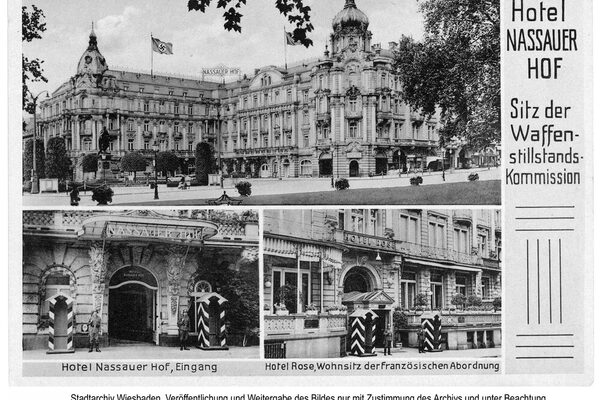Armistice Commission, German (DWStK)
After the armistice treaty between France and the German Reich was signed near Compiègne on June 22, 1940, the German Armistice Commission was convened to clarify the issues associated with the armistice, be they of a military, political or economic nature.
The Armistice Commission based in Wiesbaden took up its duties on June 30, 1940. It was assigned to the "Délégation Française auprès de la Commission Allemande d'Armistice" (DFCAA), which was responsible for conveying the instructions of the Armistice Commission to the French government and communicating the French wishes and demands to the Germans. The members of the DFCAA resided in the Hotel Rose in Wiesbaden, while those of the Armistice Commission were mainly accommodated in the Hotel Vier Jahreszeiten and the Hotel Nassauer Hof. The commission meetings were also held in the ballroom of the Nassauer Hof.
The Armistice Commission consisted of military personnel (officers, non-commissioned officers and enlisted men), civil servants and civilian employees. It was initially headed by General Karl Heinrich von Stülpnagel (1886-1944), who was succeeded in February 1941 by General Oskar Vogl (1881-1954), who remained in office until September 1944. The two German generals were succeeded on the French side by Generals Charles Huntziger, Jean Louis Humbert (1895-1975), Paul Doyen (1881-1974), Etienne Paul Beynet (1883-1969) and Louis Bérard (1886-1968). In 1944, the Armistice Commission was reduced to 15 men and relocated to Vilsbiburg in Lower Bavaria.
Literature
Festzeitung der Deutschen Waffenstillstandskommission Wiesbaden 1941 aus Anlass des Kameradschaftsabends des Unterstabes im November, Wiesbaden 1941.
Lieb, Peter: Conventional war or NS Weltanschauungskrieg? Kriegführung und Partisanenbekämpfung in Frankreich 1943/44, Munich 2007.
